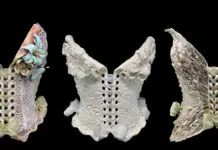The best kind of art puts a finger to your lips and shushes you. It urges you to open your eyes, stop looking and start seeing. It asks you not to simply hear with your ears, but to listen with your heart, too. In other words, it doesn’t just entertain your mind – it moves it forward, backward and every place in between.
Acclaimed poet, performer and writer of the Muscogee (Creek) Nation, Joy Harjo is a Native artist that embodies this ability to open up minds and seek more than what’s on the surface.
Having been called one of the country’s leading Native American voices, hers is a powerful vision that manifests as a fascinating fusion of tribal myth and ancestry, social concern and passion for the natural world.
“Creativity amazes me. I’m always aware that the spirit has no boundaries. It isn’t bound by geography; it isn’t bound by religious or governmental structures. The art has its own spirit, it really does, and you just follow it and take care of it,” she says.
Although her roots are technically in Oklahoma, it has been exploring and establishing roots in other parts of the country that has helped her to connect with so many, no matter the culture or walk of life.
After leaving Oklahoma to attend an Indian boarding school as a teenager, Harjo called New Mexico home for most of her life and lived in the Hawaiian islands for 11 years.
Now back in Oklahoma, she is happy living within the boundaries of the Creek Nation of her people, but her work still takes her in and out of the state, keeping her music and writing very much connected to both her people and a world community.
“I’ve always loved poetry, and I’ve always loved world music. Music and poetry blend so well, there’s no need to draw a line. If you look back at most forms of poetry, almost all of their origins go back to music,” she says.
“When I was going to school, I thought, ‘What about my own tribe? Where is our own poetry?’ I discovered it at the ceremonial grounds and realized that our poetry is sometimes spoken, sung and danced – it’s beautiful, and most of it isn’t in books.”
Growing up with her mother, who loved to sing, and grandmother and aunt who were painters, Harjo’s decision to become an artist at the age of 4 came without question.
She says that as a child she never thought she would go outside of painting and drawing, that pursuing visual arts was her calling. But music and mystery in language spoke to her when she was only nine hours shy of graduating with a degree in fine arts. It was then that she changed her major, when she says the spirit of poetry came to her.
Over the years, she’s come to play an operative role in the cultural preservation of the Muscogee Nation, where, as it is within the broader spectrum of the Pan-Indian Movement (or Native American Renaissance), there is an ever-growing emphasis on the importance of preserving tribal contributions and presences, such as history, mannerisms, mythologies and ways of storytelling.
Particularly close to Harjo’s heart is apprenticeship, where older tribe members pass down knowledge of their art forms, whether traditional or contemporary, to young people who are just learning.
“That’s one of the main reasons I came back home. I really want to assist my own tribe in developing the arts and art awareness, presence and place within my own tribe,” she says.
“I think it’s important for all of us, whatever we know or have, to pass our gifts on, no matter the culture or what our gifts may be. These gifts don’t belong to us. We have to take special care of them and be generous with them.”
With her most recent book, a memoir entitled Crazy Brave, and following in the successful footsteps of her numerous previous works, Harjo continues to enlighten lovers of language and music.
As a Native American woman, her perspective is multifaceted, yet universal, able to convey stories of freedom and survival with an always-present air of grace and peacefulness.
She poses the question, “How do we help shift society towards compassion and respect for all people and nature and all cultures and religions?
“I think that’s how we’re tested – by compassion and our ability to accept that there are people of different cultures and accept that there is more than one pathway to God, and that everyone has a map in their hearts to reach that place,” she explains.
“There’s many ways to contribute to this story that we’re all making together. The only way that it’s going to move forward is if we do so with compassion.”

























